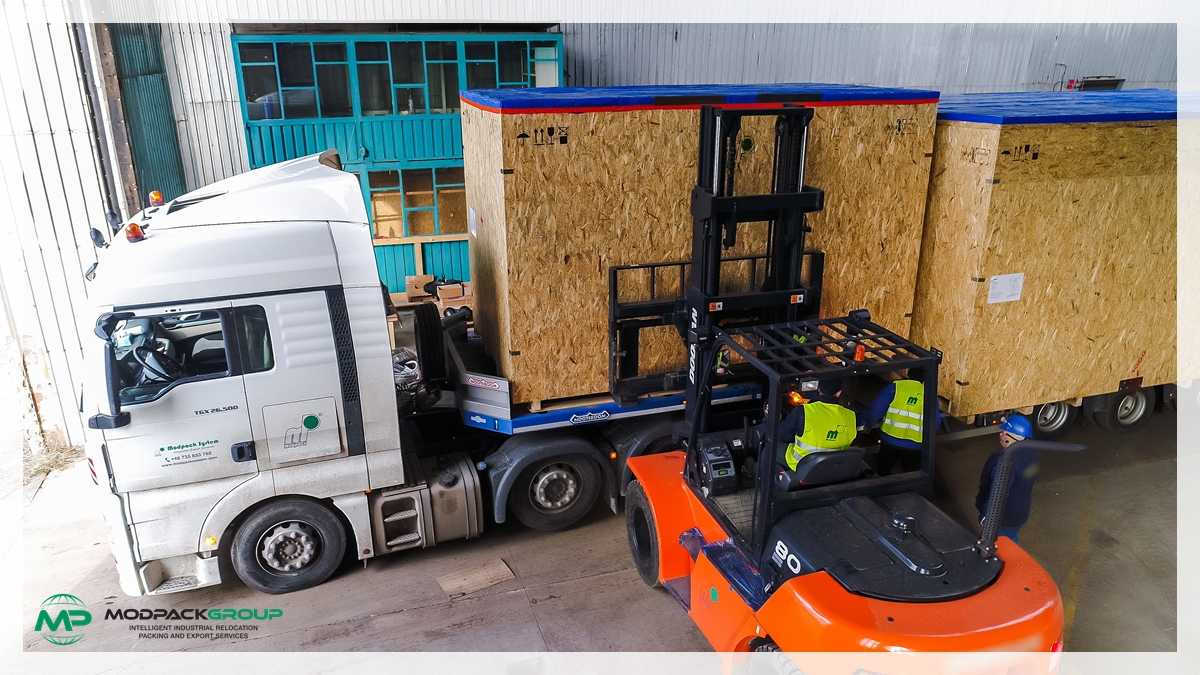Un garaj de lemn, o idee, multă muncă și o viziune orientată spre viitor – așa s-a pus bazele companiei de servicii de relocare industrială, packaging şi export – Modpack Group. În 11 ani, numărul clienţilor firmei a ajuns la aproape 1.000. Veniturile acesteia s-au situat anul trecut la 5,3 milioane de euro, iar numărul de angajaţi la 93. Anul acesta, numărul de angajaţi a ajuns la 130, iar previziunea veniturilor vizează o creştere de circa 30%.
Valentin Mălăescu povesteşte că un singur proiect de relocare a unei fabrici implică munca a circa 50-60 de persoane: de la evaluatori ai proiectului, oameni implicaţi în logistică, cei care se ocupă de transportul în locuri aflate oriunde în România sau în porturi ori aeroporturi, la munca echipei de packaging, care asamblează piesele în cutii. Urmează apoi încărcarea şi transportul, pe rute prestabilite, până la destinaţia de relocare a fabricii.
Modpack desfăsoară mii de operaţiuni pe an, 90% dintre clienții sunt firme multinaționale, iar puncte de lucru sunt în Cehia și Regatul Unit.
În afara sediului central, aflat în Ploieşti, compania foloseşte un spaţiu logistic închiriat, în Cluj cu care deserveşte clienţii din centrul ţării; din rândul celor mai recente investiţii se află una de 2 milioane de euro, într-un centru logistic din Oradea. „Vrem să acoperim zona de vest a Europei şi ieşirea spre Europa; probabil va fi gata în primăvara anului viitor”, declară Valentin Mălăescu.
Compania are însă puncte de lucru şi în Cehia, Marea Britanie (Liverpool) şi vor să deschidă un birou şi în Statele Unite. Investiţiile totale în companie şi în extindere se ridică la peste 3 milioane de euro.
Începurile business-ului Modpack
Businessul Modpack Group a început prin producţia de ambalaje din lemn într-un garaj, evoluând ulterior în direcţiile transportului multimodal şi a relocărilor industriale. Valentin Mălăescu spune că au împrumutat un concept vestic, one stop shop, prin intermediul căruia pentru aproximativ 60% dintre clienţii lor oferă servicii integrate, de la demontare de echipamente, ambalare, transport către o altă destinaţie oriunde în lume – rutier, maritim şi aerian. Antreprenorul spune că acoperă aproximativ orice tip de industrie, având capabilitatea să împacheteze şi să mute orice tip de echipament. 90% dintre clienţi vin însă din industria petrolieră, a tutunului, alimentară, automotive.
Cu o vastă experiență în domeniu, Valentin Mălăescu a demarat primii paşi în start-up-ul Modpack
„A fost destul de greu să fac acest pas, în multinaţionale câştigam bine în perioada respectivă, dar aveam vreo 36 de ani, eram sătul de munca în corporaţie; şi într-o firmă de familie sunt reguli şi este mult stres, dar stresul la noi este generat în general de client”, afirmă Valentin Mălăescu.
Fratele său, Bogdan Mălăescu, s-a alăturat afacerii de la început. De profesie inginer economist, el s-a axat pe dezvoltarea relaţiilor cu clienţii, pe domeniul financiar. Iar dacă iniţial îşi ajuta fratele doar în timpul liber, după doi ani s-a dedicat şi el afacerii de familie.
Bazele firmei au fost puse contractând drept client o firmă din Bucureşti, furnizori de echipamente, iar partea de ambalaje din lemn a fost dezvoltată împreună cu producătorul ploieştean de rulmenţi Timken.
„De la fiecare client am învăţat câte ceva şi am dezvoltat câte o arie de activitate; am plecat cu doi clienţi în 2007, cu o cifră de afaceri în perioada respectivă de undeva la 20.000 de euro pe an, iar banii care s-au investit la început au fost luaţi de la bancă”, descrie Valentin Mălăescu începuturile afacerii.
Au cumpărat un camion, câteva utilaje, au început în nişte hale foarte mici – la un moment dat spaţiul lor de lucru era de fapt curtea unei cunoştinţe dintr-o comună din Ploieşti. De la un spaţiu de lucru iniţial de 50 de metri pătraţi, sediul din Ploieşti s-s-a extins astăzi pe o suprafaţă de 5.000 de metri pătraţi.
Una dintre etapele importante a fost la doi ani după ce au început producţia de ambalaje: au fost contactaţi de o firmă din Olanda, un competitor al lor din Utrecht, cu acelaşi obiect de activitate ca şi ei, care le-a propus o colaborare pentru un proiect de relocare. Cu doar 10 angajaţi (dintre ei, 8 sunt încă în companie), au acceptat proiectul despre care spun că a fost cel în care au învăţat să facă ambalare industrială în locul ales de client – „Acolo efectiv am furat meserie”.
În prezent, businessul s-a divizat în câteva centre de profit, partea de relocări industriale generând circa 30% din business. Au avut câteva proiecte mari, exemple relevante în acest sens fiind serviciile de relocare acordate unor producători de ţigarete sau demontarea şi împachetarea unor echipamente în Africa.
În urmă cu câţiva ani, au făcut şi primii paşi în afara ţării. Au încercat iniţial să deschidă un punct de lucru în Polonia, dar, mai ales din cauza spiritului naţionalist de acolo, care favorizează afacerile poloneze, s-au reorientat spre Cehia, unde au şi în prezent un birou. „Ne-am gândit că se află în centrul Europei şi că este aproape de Germania, că putem dezvolta ceva în zona respectivă. Şi ei sunt mai rigizi, astfel, chiar dacă avem birouri acolo, le folosim mai mult pentru marketing,” spune Valentin Mălăescu.
În ianuarie anul acesta s-au extins în Liverpool, oraş ales din perspectiva Brexitului: „Poate se vor muta masiv multe zone de producţie, spre exemplu linia de producţie pentru Land Rover Discovery pleacă din Liverpool şi se mută în Slovacia; poate alţii vor să vină în Regatul Unit.”
Tot anul acesta, şi-au anunţat şi prezenţa în Statele Unite, ţară pe care au ales-o prin prisma clienţilor pe care îi au deja. „Ne-am dus acolo fiindcă acum 60-70% dintre clienţi sunt americani.”
Cum evoluează industria locală prin prisma mutărilor făcute de Modpack System
Din observaţiile lui Valentin Mălăescu, aceasta se află în cădere liberă. „Sunt multe semnale, fabrici care lucrează în lohn, în general pe automotive, care încep să se mute, spre Maroc, în Africa, sunt fabrici care lucrează tot în lohn în industria textilă care aleg Republica Moldova sau Macedonia, Serbia, îşi mută anumite linii de fabricaţie în alte ţări; dacă le ies cărţile, probabil că se vor muta de tot.”
Citește și Modpack Group, creștere de 20% în primul semestru din 2018
El este de părere că prin presiunile salariale actuale, în 5-10 ani industria lohnului în automotive şi textile nu va mai fi suficient de competitivă. Pe de altă parte, observă beneficii aduse de tehnologie: „Industria se dezvoltă în fabricile unde se folosesc tehnologie, roboţi, producţie inteligentă, văd că vin investiţii, apoi văd că vin investiţii puternice din China, probabil că global multe companii străine îşi închid businessurile în China, şi încep să se reloce spre Europa; chinezii au clonat deja acele businessuri, astfel că vin cu fabricile lor şi investesc în România”, a declarat Valentin Mălăescu.
English version
Millions of euros from industrial relocations, the business that started in a garage
A wooden garage, an idea, a lot of work and a future-oriented vision – this is how the company of industrial relocation services, packaging and Export- Modpack Group was founded. In 11 years, the company’s customer number has reached almost 1,000. Its revenues were last year at 5.3 million euros, and the number of employees at 93. This year, the number of employees reached 130, and the revenue forecast aims at an increase of about 30%.
Valentin Mălăescu says that a single factory relocation project involves the work of about 50-60 people: from Project evaluators, people involved in logistics, those dealing with transport to places anywhere in Romania or in ports or airports, the work of the packaging team, which assembles the pieces into boxes. Then the loading and transport, on pre-established routes, to the factory’s relocation destination. This is where the subcontractors, respectively, those who unload the products come into the picture.
Modpack runs thousands of operations a year. Among Modpack customers, 90% are multinational companies.
Outside the headquarters, located in Ploiesti (Romania), the company uses a rented logistic space in Cluj where it serves customers in the center of the country; among the most recent investments is a 2 million euro for a logistics centre in Oradea. „We want to cover the western area of Europe and the exit towards Europe; It’ll probably be ready in the spring of next year. ”
However, the company also has facilities in the Czech Republic (Prague), United Kingdom (Liverpool) and it is going to open an office in the United States, as well. The total investments in the company and in the expansion go up to more than EUR 3 million.
The beginnings of Modpack Business
The business of Modpack Group began with the production of wooden packaging in a garage, subsequently evolving in the directions of multimodal transport and industrial relocations. Valentin Mălăescu says they borrowed a Western concept, one stop shop, through which for about 60% of their customers offer integrated services, from dismantling equipment, packaging, transport to another destination anywhere in the world – road, sea and air. The entrepreneur says it covers about any type of industry, having the capability to pack up and move any type of equipment. 90% of customers come from the oil industry, tobacco, food, automotive.
With an extensive experience in the field, Valentin Mălăescu made the first steps in the Modpack business
„It was hard enough to take this step, in multinationals we earned pretty well during that period, but I was about 36 years old, I was tired of corporate work; And in a family company there are rules and it’s a lot of stress, but stress for us is generally generated by the client. ”
His brother, Bogdan Mălăescu, joined the business from the beginning. As an economist engineer, he focused on developing customer relations in the financial field. And even if he initially helped his brother only in his spare time, after two years he also devoted himself to the family business.
The company was founded by contracting a company in Bucharest dealing with equipment supplies as a customer, and the wooden packaging was developed along with the Timken bearing manufacturer from Ploiesti.
„From each customer we learned something and developed an area of activity; I started up with two customers in 2007, with a turnover in that period from somewhere at 20,000 euros a year, and the money that was invested at first was loaned from the bank” Valentin Mălăescu describes the beginnings of the business.
They bought a truck, some machines, started in very small halls – at one point their working space was the yard of an acquaintance from a commune in Ploiesti. From an initial working space of 50 square meters, the headquarters from Ploiesti was expanded nowadays to an area of 5,000 square meters.
One of the important steps was two years after the production of packaging began: they were contacted by a company in the Netherlands, one of their competitors in Utrecht, with the same activity field as theirs, which proposed a collaboration for an industrial relocation project. With only 10 employees (8 of them are still in the company), they accepted the project that they said was the one during which they learned to do industrial packaging in the place chosen by the customer – „There we actually learnt the profession”.
Currently, the business has divided into several profit centers, with the industrial relocation generating about 30% of the business. They had several large projects, relevant examples in this regard being the relocation services granted to tobbaco manufacturers or the dismantling and packaging of equipment in Africa, by plane, for a local beverage producer.
A few years ago, they took the first steps out of the country. They initially tried to open a place of business in Poland, but they have reoriented to the Czech Republic, where they currently have an office. „We thought it was in the centre of Europe and that it is close to Germany, that we can develop something in the area. And they’re stiffer, so even if we have offices there, we use them more for marketing purposes”
In January this year they continue their growth to Liverpool.
This year, they also announced their presence in the United States, which they have chosen in terms of the customers they already have „We went there because now 60-70% of customers are Americans.”
How the local industry evolves in the light of the moves made by Modpack System
From Valentin Mălăescu’s observations, it is plummeting. „There are many signals that factories working in Lohn, generally in automotive industry, begin to move to Morocco, to Africa, there are factories that work in Lohn in the textile industry that choose the Republic of Moldova or Macedonia, Serbia or move certain lines of manufacturing to other countries; If it works out for them, they’ll probably move away. ”
He believes that under the current wage pressures, in 5-10 years the Lohn industry in automotive and textiles will no longer be competitive enough. On the other hand, it observes the benefits of technology: „Industry develops in factories where technology, robots, smart production are used, I see investments coming, then I see that strong investments come from China, probably on a global level many foreign companies close their businesses in China, and begin to relocate towards Europe, Valentin Mălăescu said.



